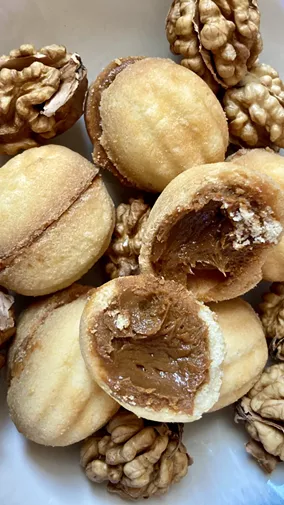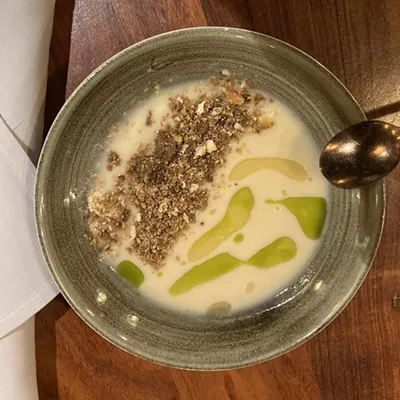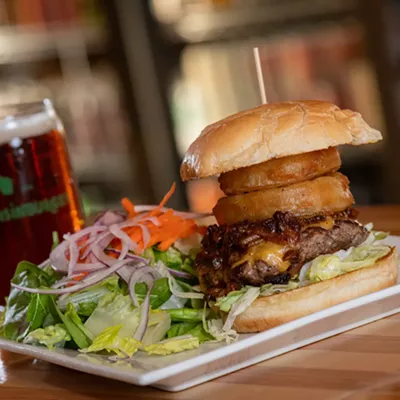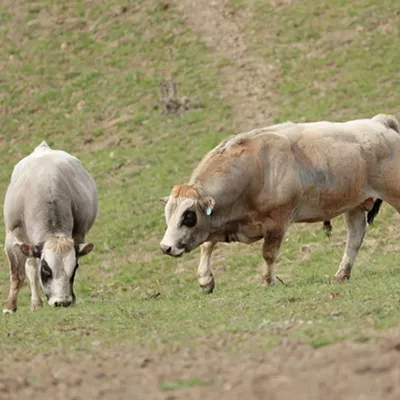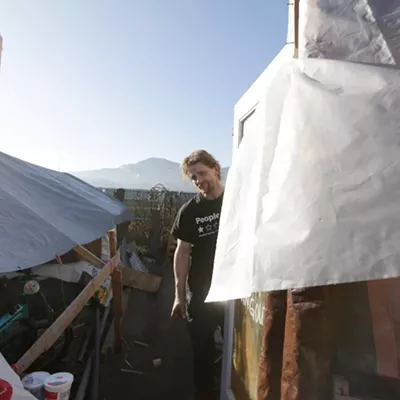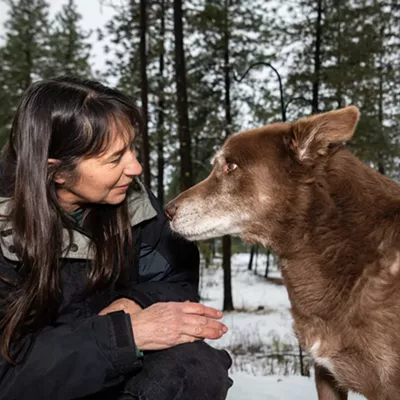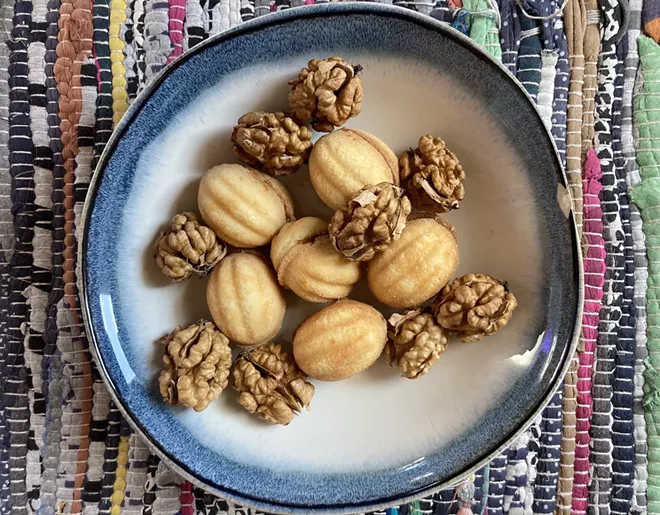
This is an installment of the Inlander's yearlong project "Around the World in 80 Plates," a quest to find 80 foods and drinks in the Spokane area representing 80 different places. Read the introduction to the project here.
Count of dishes/places: 55
I wandered into European Delicatessen Food & Deli in Spokane Valley without any clue what I was looking for. It's my favorite way to shop. It's a special kind of luxury — to be guided not by necessity, but by attraction and curiosity instead.
I do notice, however, this always draws some attention from store attendants on guard for shoplifters. Someone wandering alone down the aisles without much intention is exactly the type of person who raises some eyebrows. I try to keep my hands visible and to not pick items off the shelves, just in case this assuages their fears. I'm not sure it does.
I absolutely paid for the two items I eventually carried out with me, after long stare downs with labels that were mostly in Cyrillic scripts. I even had a nice chat at the check out once the attendant figured out I only spoke English.
I walked out not only with a couple food items and a new friend, but a completely unexpected, highly specific theme for this installment of Around the World.
Usually, each post is centered on a specific country, or at least a region, of the world. But this week, we travel to a couple different spots on the globe thanks to a rather common ingredient: the walnut.
ORESHKI FROM THE FORMER SOVIET UNION
In the refrigerated section of the import shop, next to the root vegetables and farmer cheeses, small to-go boxes of handmade desserts tempt shoppers with a sweet tooth, like me.
You can buy a personal slice of cake, which I think is incredibly thoughtful, or a handful of trubochki, cannoli-like sweets made from thin waffles rolled into cigars and filled with cream cheese or caramel.
But the box I decided to take off the shelf was filled with cookies that looked like whole walnut shells. The outside of each sweet was delicately ridged and brown, while a seam around the middle promised that the halves were probably filled with some kind of sticky goodness inside.
A quick Google search for "walnut shaped cookies" told me these were oreshki, an extremely popular Eastern European treat that seemingly everyone already knew about but me.
"Oreshki" means "nuts" in Russian, and these are definitely inspired by the humble walnut, though they're a lot more popular with kids than the real thing. The outside is a simple sugar cookie dough, and the inside is a creamy, caramel-y dulce de leche filling, usually made from boiling a whole can of sweetened condensed milk for hours on end.
According to NPR's Alina Selyukh, these cookies were invented in the Soviet Union when specialty foods were scarce. This cookie uses kitchen staples — flour, sugar, butter, and milk — but levels up the whole experience with its creative shape.
To make oreshki, you need an oreshnitsa, a rather intense looking cast iron mold that's only function is to make these cookies. For Slavs, it's worth the kitchen space.
To this day, oreshki is still a staple in most Eastern European countries and childhoods, Selyukh says. Romanians have a chocolate-filled version called nuci, and every baker in Georgia makes them, says Georgian journalist Giorgi Lomsadze.
I can absolutely see why. The cookie is buttery and crumbly, but it crumbles into the soft center instead of crumbling all over your hands. The filling is deeply sweet and perfectly smooth. Some recipes add real walnuts to the filling. But I think I prefer the complete illusion instead.
WALNUTS (AND YANCHMISH) FROM UZBEKISTAN
The other item I took off the shelf was a box of real walnuts — shelled walnuts all the way from Uzbekistan.
Now, from what I can tell, there's nothing particularly unique about walnuts from Uzbekistan. I liked the way that these walnuts were kept whole instead of halved, a presentation I have never seen before. But I don't know if that's an Uzbek thing or not.
To be honest, I just thought that my chances of finding any other food from Uzbekistan in Spokane were low, so I wanted to take advantage of what was right in front of me.
To justify my decision more, I thought I'd find an Uzbek recipe that features walnuts. I'd make an Uzbek recipe with Uzbek walnuts and consider it a success.
But most Uzbek food, it turns out, doesn't feature walnuts. It's similar to most Central Asian cuisines — heavy on plov, a rice pilaf with meat, carrots, onions and turmeric; or manti, dumplings stuffed with beef and spices; or samsa, a savory filled pastry similar to an Indian samosa.
But there is one classic Central Asian treat, hailing from either Uzbekistan or neighboring Tajikistan, that relies heavily on walnuts. It's called yanchmish.
Yanchmish is an Uzbek/Tajik dessert that's basically just walnuts and raisins ground together and rolled into balls. Sometimes breadcrumbs or oat flour are added to keep the mixture together, or the balls are rolled in powdered sugar to make them a little prettier.
Turns out, as Uzbekistan's production of walnuts is growing, its grape production is already globally established. It's a major producer of raisins — the U.S. Department of Agriculture ranks it the seventh largest producer of raisins in the world.
So I feel confident that my yanchmish are a pretty Uzbek treat. They're sweet and sticky and pretty easy to make, as long as your hands are a little wet as you shape them, to keep the dough from sticking to your skin.
Traditionally, they're served for tea or holidays. For me, they're perfect for a pre-workout snack or a sugary end to a meal. That is, if I've eaten all my fake-walnut cookies already. ♦
Have an idea for what I should eat next? Wanna make me a traditional dish from your hometown or suggest a hidden treat from somewhere else in the world? Send 80 Plates tips and ideas to [email protected].

